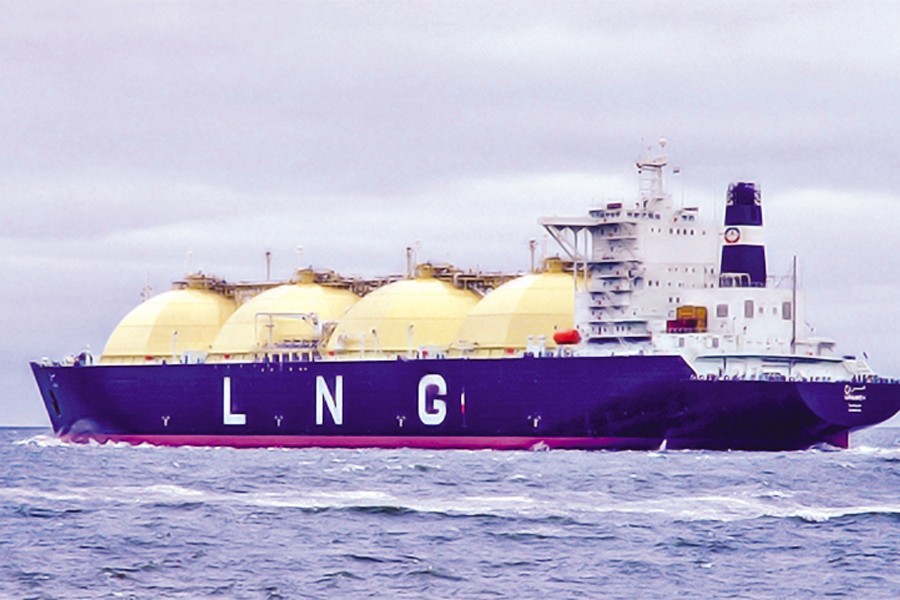BD inks LNG deal with US co to buy 5.0 MTPA
It's not an obligatory agreement to purchase LNG, says Energy Adviser

Published :
Updated :

US's Argent LNG has inked a non-binding agreement with the government of Bangladesh to supply up to 5.0 million tonnes per annum (MTPA) of liquefied natural gas (LNG).
The Bangladesh Investment Development Authority (BIDA) on Saturday announced the signing of a transformative Heads of Agreement (HOA) between the government of Bangladesh and Louisiana-based Argent LLC for the purchase of LNG.
US President Donald Trump's "Drill, Baby, Drill" energy mandate, promoting the exploration and export of US energy resources, provided the foundation for this historic agreement.
The deal was signed by BIDA Executive Chairman Ashik Chowdhury and Chairman and CEO of Argent LNG Jonathan Bass in a ceremony at the Bangladesh Embassy in Washington on Friday.
"Petrobangla has been seeking long-term solutions to the rising demand for energy in Bangladesh. This agreement not only ensures a reliable energy supply for Bangladesh's expanding industrial base but also strengthens our strategic partnership with the United States," Mr Chowdhury said.
By embracing the principles of 'America First' and 'Bangladesh First,' he added that this collaboration highlights a fair, balanced, and mutually beneficial approach that harnesses the strengths of both nations to drive economic growth, regional stability, and shared prosperity for our people.
"Argent LNG is pleased to announce the signing of a HOA with Bangladesh, marking a significant step in strengthening energy partnerships," said Mr Bass.
"This agreement paves the way for the United States to supply reliable baseload energy to Bangladesh, enabling the country to expand its ability to grow. This partnership underscores our shared commitment to fostering bilateral and equitable trade, supporting supply chain securitisation, and deepening ties between our two nations."
The signing of the deal also featured Chett Chiasson, executive director of the Greater Lafourche Port Commission (GLPC), which oversees Port Fourchon, a major energy hub in Louisiana.
"This partnership is a testament to Louisiana's rich history as an energy powerhouse and its growing role in LNG exports as a critical driver of global energy security. It's another win for American energy policy, bringing high-paying jobs to Louisiana while bolstering the United States' leadership in the global energy market," said Chiasson.
The agreement underscores growing energy collaboration between the two nations, reflecting Bangladesh's role as a rising economic force in South and Southeast Asia and the US's position as a reliable supplier of clean energy, said a BIDA press release on Saturday.
It is also expected to contribute to global energy transition efforts, reducing reliance on higher-carbon fuels while fostering economic growth.
This landmark initiative reaffirms BIDA's commitment to fostering impactful international partnerships that drive industrial growth and economic prosperity.
"This is a facilitation agreement," Power, Energy and Mineral Resources Adviser Muhammad Fouzul Kabir Khan told the FE Saturday. "It's not an obligatory agreement to purchase LNG from a US company."
This deal was inked considering the country's future energy security, the adviser said.
Before inking any obligatory deal to buy LNG from any buyer, a prior approval by the cabinet committee is necessary, he said, elaborating the nature of the agreement.
This is the first major US LNG supply deal since President Donald Trump took office on Monday, said sources.
Argent Energy is developing a 25 MTPA LNG facility in Louisiana from where it intends to supply LNG to Bangladesh.
If the Argent LNG project in Port Fourchon is completed, its cargoes could be sold to Petrobangla, according to the agreement.
In Bangladesh, private sector is also free to import LNG and re-gasified LNG (RLNG) under "The LNG or RLNG Infrastructure Installation, Import and Supply Policy 2019 (amended 2023)',
Private parties concerned will have the liberty to sell re-gasified LNG at the prices negotiated with their buyers under the amended LNG-import policy adopted by the government.
Private parties, local or foreign, are free to import both LNG and RLNG, re-gasify LNG by building floating storage and re-gasification unit (FSRU) and sell the re-gasified liquefied natural gas to consumers of their choice.
The government will not interfere in fixing the selling prices of the LNG or RLNG imported by the private parties, the policy spells out.
The private-sector LNG or RLNG importers would also be allowed to use the imported LNG or RLNG in their own power plants and industrial units and for other commercial purposes.
They would also have the liberty to supply the RLNG to others' power plants, industrial units and commercial entities.
The private importers will, however, be allowed to sell the 'surplus' RLNG, not exceeding 25 per cent of their total imported volume, to the state-run Petrobangla that markets petroleum products locally, the policy states.
But the price of the RLNG to be sold to Petrobangla should be determined by it, the policy notes.
To facilitate smooth import of LNG and supply of RLNG to consumers, the private sector will have to build international-standard jetties or platforms, storage tanks, re-gasification plants and pipeline networks.
The importers can also use the natural-gas pipeline or distribution network of the Petrobangla to supply their RLNG to the end-users with its prior permission and on payment of wheeling charges.
Azizjst@yahoo.com


 For all latest news, follow The Financial Express Google News channel.
For all latest news, follow The Financial Express Google News channel.